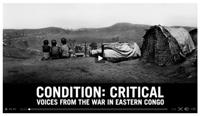MSF Launches International Initiative Highlighting Plight of Civilians Caught in Eastern Congo?s War
New York, November 20, 2008 — The international medical humanitarian organization Doctors Without Borders/Médecins Sans Frontières (MSF) today launched “Condition:Critical,” a multimedia initiative aiming to bring global attention to the humanitarian consequences of the intensifying war in eastern Democratic Republic of Congo.
Through testimonies, photos, and video, Condition: Critical goes beyond headlines and news reports to document how civilians are struggling to survive in Congo’s North and South Kivu provinces, the front lines of a long-running war, where violence, displacement, and sexual violence are mainstays of daily life.
The video feature is built around photographs taken by World Press Photo laureate Cédric Gerbehaye, who worked with MSF in the region for close to a year.
Condition: Critical is online at: http://www.condition-critical.org
The website will be regularly updated to provide fresh news and material in an effort to keep the crisis in the spotlight.
MSF has been working in North and South Kivu since 1992, and in the Democratic Republic of Congo since 1981. MSF medical teams carry out emergency surgery, treat injuries including gunshot wounds and burns, run mobile clinics to reach those who have fled to safer, more remote areas, provide health care in hospitals and health centers, treat diseases such as cholera, provide medical care to victims of sexual violence, and provide psychological support to those traumatized by what they have experienced.
MSF has increased its emergency response in the region to cope with the deteriorating situation. It is currently working in Goma and other parts of North and South Kivu including Rutshuru, Kibati, Kirotshe, Kiwanja, Buhimba, Masisi, Kitchanga, Mweso, Nyanzale, Kayna, Bukavu, Minova, and Kalonge.
MSF remains extremely concerned for the hundreds of thousands of people still on the move who are continuously fleeing ongoing fighting. Many of the displaced and local residents continue to be in urgent need of food, clean water, health care, and basic items such as blankets, hygiene kits, and shelter materials.
In addition, the recent fighting has led to an increase in the number of cholera patients, with cases now being documented in places where cholera is not normally a major health threat. Risk factors for contracting cholera include poor sanitation, lack of clean water, the constant movement of populations, and crowded conditions in displaced camps.




